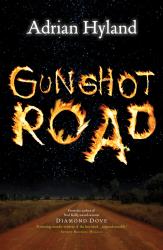GUNSHOT ROAD is the second Emily Tempest novel from Australian author Adrian Hyland. Set in the outback of Australia, GUNSHOT ROAD has one of those magnificently authentic Australian voices that you just know comes from an author who knows his place, and his characters very very well.
Emily Tempest is a tricky woman. She's one of those mouthy, stubborn, opinionated women who will do what she believes is right, no matter who or what says no. She's going to stick to her case, she's going to support her people, she's going to follow her instinct - and everybody else, well they can like it or lump it. Either way - their choice. Emily's her own woman. Joining the police seems like an inexplicable decision for a woman like Emily. And then again, it doesn't - nothing like fighting the system from within after all. Besides, none of her colleagues have the slightest idea what or who she is or what she'll do next. Least of all somebody "Acting" as the boss. Poor Cockburn - he's new in town and he doesn't quite get the idea that you never, ever ever poke a snake with a stick.
When Doc is found dead in his shack, a hammer in his throat and his latest combatant drunk and snoring away in the bunk beside him, Cockburn and just about everybody else is happy to accept the bleeding obvious. Emily knows something's not right and she knows these people - Doc, the accused Wireless, the community, and she comes to know the artist sitting on the rockface above Doc's who can also see the strange patterns in the landscape.
DIAMOND DOVE, the first Emily Tempest novel was a really really good book, but GUNSHOT ROAD is more. Much much more. Hyland's taken this book further into country, aboriginal lore and lifestyle. Whilst weaving a tale of death, deception and much nefarious goings on, which is a reasonable puzzle, carefully laid out, and ultimately plausible. Perhaps a little too plausible. But more than that, into this western "plausibility" Hyland has seamlessly woven Aboriginal lore and dreaming. He's also not shied away from the less savoury aspects of these outback communities and the ravages of the difficult balancing act between traditional and western life for so many people. But he does that with a wonderful touch, with an inspirational feeling of true admiration and affection for these people.
I read GUNSHOT ROAD on a cold Central-Western Victorian day, sat in front of an open fire. Yet I could see the heat haze. Taste the bulldust as it swirled around my feet. Hear the beautiful, haunting, glorious sound of singing to country. I could see Emily, I could sense her exasperation, feel her frustration, hear the determination. GUNSHOT ROAD made me yearn to be out there, perhaps to come across Emily and maybe cheer a bit from a safe distance. To be privileged enough to really hear language, that singing to country and to witness the intrinsic, heartfelt, deep connection to place and a way of life. GUNSHOT ROAD has left me so very very pleased that Hyland wrote a second book, hoping there is a third, and filled with the need to pack the car and head off into the place that Hyland writes so well.
Gunshot Road

Emily Tempest. Small, black, snaky as a taipan's tooth: the woman least likely to pursue a career in policing.
Now, somehow, Emily's become the Aboriginal Community Police Officer for the outback (not to mention throwback) town of Bluebush. Being allergic both to authority and to keeping her big mouth shut, she's immediately at odds with her new boss. And a death at the Green Swamp Well Roadhouse just makes things worse. Officially it's a simple case of two old drunks and a hammer.
Emily's not convinced.
Add comment